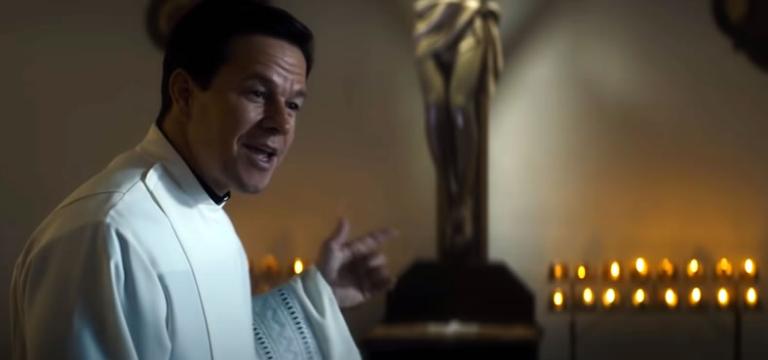
As an actor, Mark Wahlberg has been a cop and a crook, a boxer and a foul-mouthed bear’s best friend. But I don’t think he’s ever played a priest before. For Wahlberg, Father Stu—a movie which he produced as well as starred in—was a true passion project. He spent “millions” of his own money to make sure the movie was made. He told Insider.com that he prayed “every day about getting this film made,” and—as also reported by Patheos blogger Kate O’Hare—he wants to make more faith-based films.
“I’m hoping lots more will come to me now, not just stories that I can star in but also can help others get their works off the ground,” he told Insider.com. “I want to do more of this in the future, and there’s a huge audience for it.”
He’s right: There is an audience for faith-based and faith-friendly movies. The R-rated Father Stu might be a tough sell to some Christians (you can read all about why in my Plugged In review). But it’s also a well-made and inspiring film that shows God moving in this messy world of ours.
Here’s four lessons I gleaned from Father Stu. (And while this doesn’t reveal any more plot points than the trailers do themselves, be mindful that there could be spoilers.)
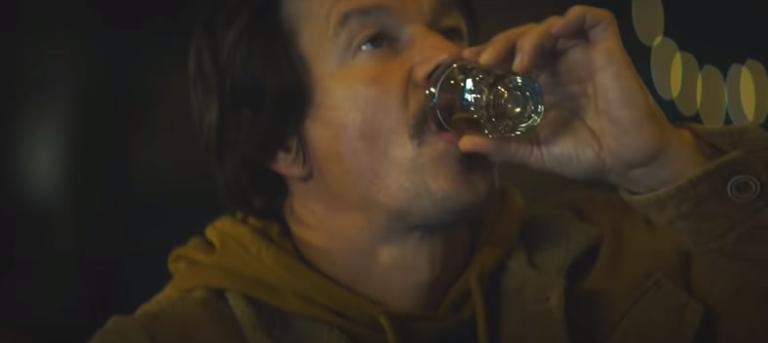
God Can Take Our Anger
When we first meet Wahlberg’s Stu, he’s a pretty troubled guy. He cashes meager paydays as a boxer, but the window on his athletic career is closing. He apparently drifts from odd jobs here and there without a real plan. His father is all but out of the picture (and, when we see the two talk, we realize that’s probably a good thing). And, as he drinks beside the grave of his little brother, we can see that he’s pretty angry with God.
He starts shouting at a statue of Jesus in the cemetery, furious that he would’ve taken his little bro. He gets no answer, of course, and he finally punches Jesus in the face, leaving the statue unharmed but Stu with bloodied knuckles. He leaves some blood on the marble white, too; an echo of how the real Jesus bled and died for mankind, suffering at our hands.
Tellingly, the statue that Stu punishes—the physical manifestation of Stu’s spiritual rage—depicts Jesus pointing to His chest. To His heart, which in Catholicism is a symbol of His boundless love and grace. The movie suggests that God’s work in Stu’s own heart begins the very next day. And Stu doesn’t suspect a thing.
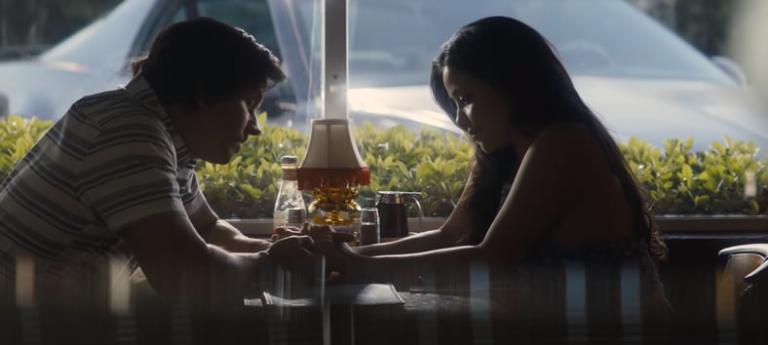
God Can Work Through Our Selfishness
Stu’s arrested for disorderly conduct after slugging the statue. But he leaves the jailhouse with a new purpose. No, no—he’s not turning his life over to Christ. For him, God is the enemy, if He’s even there at all. But Stu tells his mom (played by Jacki Weaver) that he knows what he wants to do with his life now. (“Seventh time’s the charm,” his mom sighs.) He’s going to go to Hollywood and become an actor.
It’s all a bit ridiculous, of course. But Mom’s supportive, Stu moves to L.A. and takes a job at a supermarket to pay the bills. There he sees a woman named Carmen, and he’s immediately smitten.
“I’d wait 40 years in the desert for you,” Stu says.
“Start with an hour in church,” Carmen tells him.
So begins a strange, stuttering relationship between the two of them—a relationship that revolves, oddly, on Stu’s relationship with Carmen’s devout Catholicism. Faith is deeply important to Carmen, and she won’t date anyone who doesn’t share her faith or her devotion.
So, for Carmen’s sake, Stu starts acting like the Catholic that Carmen wants him to be. He helps her teach Sunday school. He takes confirmation classes and is even baptized into the Catholic Church. Does any of this touch him? Move him toward real belief and devotion? Hard to say, but the movie suggests that whatever faith he has is about as deep as a mud puddle. He’s Catholic now mostly because Carmen wants him to be. But even if Stu doesn’t know it, God’s at work somewhere—tilling the ground, planting the seeds, watering the soil ‘til something sprouts. God used Stu’s own selfish motivations to lead the guy closer to Him.
I’m not Catholic: I was raised in a more evangelical Protestant tradition. And in that tradition, motivation is important: We shouldn’t do things out of duty, we’re told, but because we want to. And I totally understand that.
But in my own life, duty moves me toward want. Push into a good habit of reading the Bible, and I find that you want to read the Bible more. And in the same way, I think sometimes when we pursue God or faith for more selfish reasons—attend a youth group meeting for the pizza or go to church to silence a pestering relative—God often shows up.
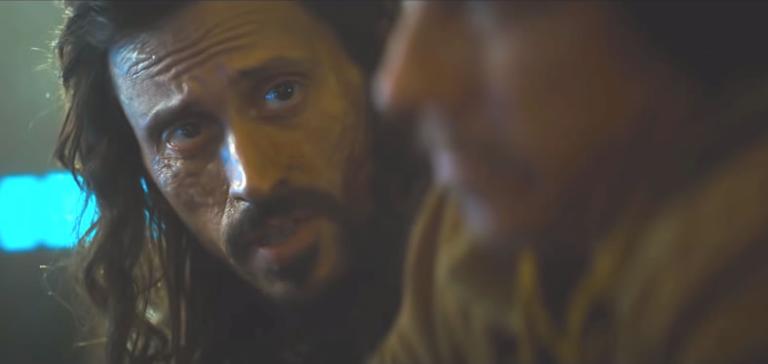
God Is Everywhere—Even Some Unlikely Places
As Stu spends more time in the church, he begins to ask questions, slowly working on the religious mystery. Late one night, we see him in a bar, still full of questions, as a mysterious barfly engages him on a deeper conversation about life and meaning. Stu’s new friend tells him that life is hard; that it’ll give him (and everyone) plenty of reasons to be angry and bitter. “But you only need one to be grateful,” he adds. And to live in gratitude can change the whole template of your life.
Stu seems to be only half listening. And he certainly doesn’t listen to the barfly when he tells him to be careful driving home. He gets into a horrific accident and finds himself on the asphalt, broken and bleeding. And there he sees (or imagine he sees) Mary—the Mother Mary—leaning over him, comforting him.
That accident becomes a pivot point: Stu’s life turns around, and he spiritually starts walking in an entirely different direction. He begins to wonder whether that barfly might’ve been Jesus, stopping by for a visit.
You wouldn’t expect Jesus to choose a bar to hang out in, or masquerade as kind of a scruffy vagabond. Only, of course, that’s pretty much exactly what Jesus did back in the day. He wandered from town to town, land to land, speaking to people He wasn’t supposed to speak to, hanging out in places that no self-respecting Jew would ever go.
Father Stu leaves it up to the viewer as to whether the guy was really Jesus. But in watching, I actually think that Jesus was around the whole time. He was with Stu when Stu punched that statue of Him; with him when Stu chose to go to California; with him as Stu began to go to church for his own selfish reasons.
I believe that Jesus is around us, too. He doesn’t physically accompany us to local dives, maybe, but I think that He speaks to us more than we often imagine. Like Stu, we sometimes have a hard time listening.
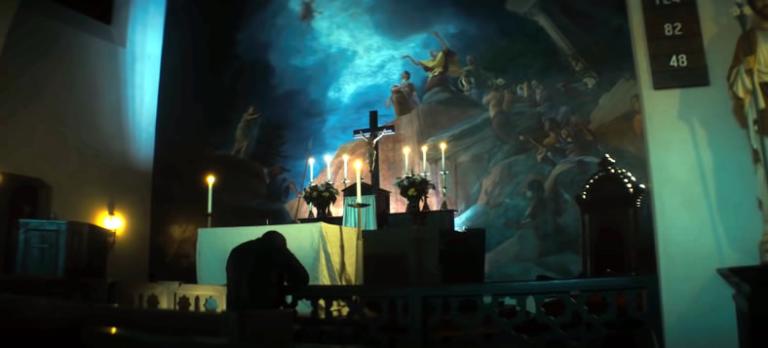
God Can Show Up Even In Our Suffering
After his accident, Stu finds that God is far more real, and more important, than he had imagined. He’s alive for a reason, he figures. And as he recovers, Stu begins to wonder whether God is calling him into the priesthood. It’d be a tremendous sacrifice, he knows. Carmen—the woman who led Stu to Christ—won’t like it one little bit. But he grows more and more convicted that that’s what he’s supposed to do.
But as Stu goes through the process of learning how to become a priest, he (and we) discover that God will ask him to make a much greater sacrifice.
Stu learns that he has something called inclusion body myositis, a disease that acts like ALS in that it robs your body’s ability to move and function as it ought to. It’s a horrible diagnosis, and it shakes Stu to his roots. He continues to push through the ordination process, but the disease eats away at him rapidly. In the movie’s most stirring moment, Stu goes to a sanctuary, tosses away his crutches and crawls to the altar. Angry and confused, he begins to pray.
It’s a really nice counterpoint to Stu’s raging dialogue with God years earlier, at his brother’s gravesite. In that earlier scene, Stu was furious with God (if He was even there), that He would take away his brother like He did. Here, Stu’s mystified: Why, just when he found his way—when he was all in on serving God—would God lead him down this terrible path?
It’s a difficult question, and one that neither Stu nor we have a great answer for. But Stu’s ready to trust God now—no matter the circumstances, no matter the cost. And in a postscript, we hear from the real Father Stu (who died in 2014). God can work through his suffering, he says. Just as God worked through the suffering of His own Son.
In Romans 8:28, Paul tells us that “we know that for those who love God all things work together for good, for those who are called according to His purpose.”
Sometimes readers imagine that that means our own lives will be easy. That God doesn’t want those “who are called” to suffer too much. But looking at Paul’s life—and frankly, even the rest of Romans itself—we should know better.
“We rejoice in our sufferings,” Paul wrote in Romans, “knowing that suffering produces endurance, and endurance produces character, and character produces hope, and hope does not put us to shame, because God’s love has been poured into our hearts through the Holy Spirit who has been given to us.”
Father Stu suffered. For seven years, he dealt with the disease and faithfully ministered to those who came to him for help, and the movie suggests that people came to him in part because of that that suffering.
“Jesus” told Stu in that bar so long ago that life will give him plenty of reasons to be angry. His affliction was just the latest. But you need only one reason to be grateful, He said.
Stu’s suffering allowed him to reach people that maybe more clean-cut Christians couldn’t. But his gratitude for what he’s been given—gratitude toward God—allowed those people to see a hint of Christ in him. And just as so many experiences helped Stu on his own journey to faith, a visit with Father Stu might’ve been instrumental in many others’.
It’s a good thing to be mindful of. We all have experiences, and even pain points, that can be used by God.












